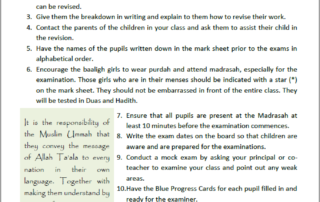Notice
Muhtaram Ulama / Mu’allimaat
Assalaamu alaykum wa rahmatullahi wa barakaatuhu
May Allah Ta’ala bless us with aafiyat in dunya and Aakhirat.
Please take note of the following;
1. Aqaaid Grade 6
This year the Grade 6 learners will be studying a new Aqaaid Kitaab. Please note that pages 31-45 should be omitted. These sections have been included in the Grade 7 syllabus and learners will cover these sections in Grade 7 Insha Allah.
2. Surah Kahaf (The first ruku and the last ruku)
Presently, with so many fitnahs around us, we have been advised by Rasulullah (sallallahu alayhi wasallam) to recite Surah Kahaf on Fridays. By reading the first ruku and the last ruku of this blessed Surah, Allah Ta’ala will protect us from all fitnahs. Even if Dajjaal has to appear, Allah Ta’ala will save us from the fitnah of Dajjaal. Those pupils in the higher grades who can recite Qur-aan Shareef should be made to recite these two rukus every Friday in the class. Insha Allah this practice will remain with them throughout their lives and will be a means of their protection in times of fitnah.
May Allah Ta’ala grant us the taufeeq to make amal. Aameen.
Ikhlaas (Good Intention)
Intention is a magical prescription that can turn sand into gold. The Hadith says “Verily actions depend upon their intentions.”
It is sometimes interpreted to mean that good intentions justify bad deeds and makes sins meritorious. This is completely wrong. Sin is always a sin no matter how noble the intention may be. For instance if someone breaks into a house to steal with the intention of giving charity then whatever he would steal will make him a thief deserving of the prescribed punishment. His good intentions would not earn him any merit nor would his sin be pardoned.
What this Hadith means is as follows:
- A good deed earns merit only if done with the right intention. For instance, salaah would earn merit when one performs it only for the divine pleasure of Allah Ta’ala; if one performs salaah to impress others, then instead of earning merit, he would earn punishment.
- The second interpretation which is germane to the present discussion is that all lawful deeds neither earn merit nor punishment, but if they are done with a good intention, they become acts of worship and earn merit. For instance eating is lawful; but if one eats with the intention that food shall give him energy and that energy he shall spend in the service of Allah, the act of eating would earn merit. Similarly if one eats with this intention that his physical body too has its rights and dues which nourishment or if one eats with the intention of getting taste and pleasure so that he can thank Allah Ta’ala, then this eating becomes an act of merit.
There is no lawful deed of life, which if done with good intention, does not become an act of merit.
A few instances shall elucidate the point:
- Honest earnings, whether by trade, service, industry or agriculture, if done with the intention of rightly fulfilling the duties enjoined by Allah towards oneself and one’s family, would become an act of merit. Then if one further intends to spend after fulfilling the needs of himself and his family, in helping the poor and in other similar good deeds. He would earn further merit.
- When a person engaged in learning intends to serve the humanity through his knowledge he would go on earning merit as long as he remains engaged in the acquisition of knowledge. For instance a student of Deen who intends to propagate Islaam, a medical student to alleviate human suffering due to disease, an engineering Student to serve his people through his specialized knowledge etc. all these acts would become acts of merit because of the intention which motivates the doer.
- A man, knowing that sustenance and subsistence is the responsibility of Allah which He shall fulfill without fail, engages in a particular profession or vocation with a view to serve humanity, his profession would earn him merit.
For instance if someone enters the medical profession consciously choosing it form among other professions in order to cure the sick, he would earn merit even if he charges for his services. Such a man would not hesitate to provide free treatment for the poor and the destitute.
A cloth merchant, who enters this profession to provide clothes to people because clothing ones self is a religious duty, which would also earn merit.
Similarly a government servant, motivated by a desire to serve the common man and fulfill his needs, would earn merit. Thus every profession becomes meritorious, provided the intention is right.
- If one dresses in finery not to show off his status or wealth, but to afford pleasure to others, it is an act of merit.
- If one treats his children with love because it is a sunnah of our eternally blessed Nabi [Sallallahu Alayhi Wassallam], it earns him merit.
- If one does the household chores because this too is a sunnah of our eternally blessed Nabi [Sallallahu Alayhi Wassallam], then this also merits reward in the hereafter.
- A loving conversation with the wife and children is a sunnah of our eternally blessed Nabi [Sallallahu Alayhi Wassallam] and has so ordained, hence such an act is also meritorious if done to follow the sunnah.
- Hospitality to guests, if shown in pursuance of sunnah is an act of merit.
- Planting a sapling or plant in the house so that it may one day be of use to some man or animal or please the onlooker, would be a good deed.
- Writing beautiful and legible to make it easy for the reader to read is an act of merit.
- If a woman dresses herself in beautiful raiment and wears ornaments and adorns her self to please her husband or if a man remains clean and neat to please his wife, both are good deeds.
- If permissible recreation is indulged to the extent needed to prepare oneself for duties, is a meritorious act.
- If a watch is kept to know salaah times and to value time in order to do good deeds, is an act that earns merit.
These are a few common examples from everyday life which can earn much merit for the doer.
Imam Ghazaali (RA) states in his lhya’-ul ulum that every lawful action in human life that is done with the right intention, earns merit. Even if husband and wife give mutual pleasure to each other, each with the intention of giving the other his or her due and making them pure, this too would give them merit.
By Hadhrat Mufti Taqi Uthmaani Saahib (daamat barakaatuhum)
Death and related Topics
To download audio:
For Mobiles: Touch and hold onto the “Listen Now” button or the name of the audio and then choose “download link” from the options that appear.
For PC: Right click the “Listen Now” button and choose the “save link as” option.


